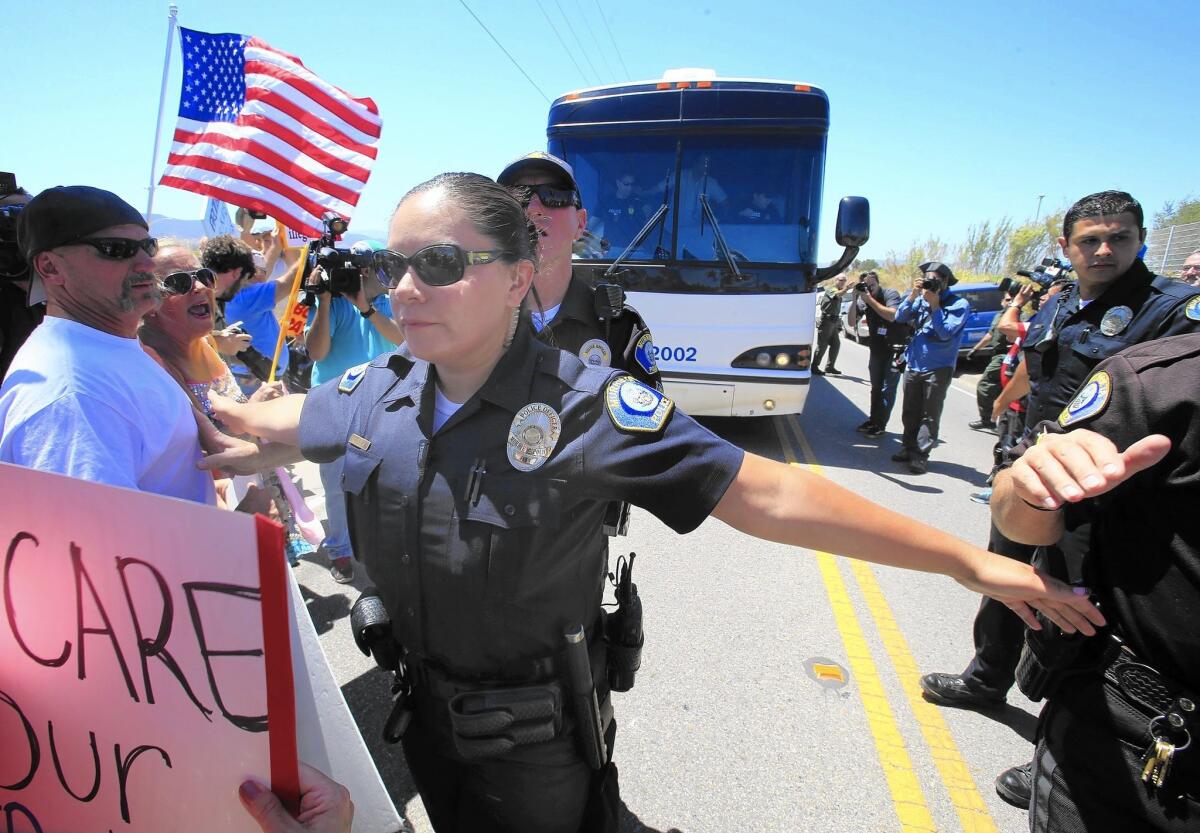The key players in Obama’s appeal on deportation deferral program

- Share via
State and federal lawyers on opposite sides of the immigration divide are set to square off in federal appeals court Friday before three judges who will decide whether to lift a temporary stay on President Obama’s executive action, which seeks to shield up to 5 million people from deportation.
The three-judge panel scheduled to hear oral arguments was selected from the U.S. 5th Circuit Court of Appeals in New Orleans, one of the most conservative circuit courts in the nation. The panel includes two conservative-leaning members.
The Obama administration appealed after a federal judge in Texas declined last week to lift the stay, which he had issued in February to put the president’s deferred action immigration programs on hold.
U.S. District Judge Andrew S. Hanen had granted the preliminary injunction to Texas and 25 other states after they sued to stop the program, arguing the president had overstepped his constitutional authority. If the administration loses, it can appeal the closely watched case to the full 5th Circuit and ultimately the U.S. Supreme Court.
The attorneys
The administration will be represented by Benjamin C. Mizer, acting assistant U.S. attorney general for the Justice Department’s Civil Division, according to a department spokesman.
Mizer, 38, former Ohio solicitor general, joined the department four years ago as a senior advisor to U.S. Atty. Gen. Eric H. Holder Jr. before starting his current job last month.
Mizer’s work in Washington and Ohio “put him in some of the most challenging and demanding positions a lawyer can encounter,” Holder said in announcing the appointment. “But in every instance, Ben has repeatedly demonstrated that he is both a gifted lawyer and a capable leader.”
A graduate of the College of Wooster and University of Michigan Law School, Mizer worked as a clerk for Judge Judith W. Rogers of the District of Columbia Circuit Court of Appeals and later for Supreme Court Justice John Paul Stevens.
“Those were jobs working on high-profile cases with difficult legal issues,” Mizer told his hometown newspaper in New Philadelphia, Ohio, adding: “I developed an expertise in appellate work. It became my niche.”
Arguing on behalf of Texas and the other states that have sued to stop Obama’s executive action will be Texas Solicitor Gen. Scott Keller.
Keller was previously chief counsel for another former state solicitor general, Sen. Ted Cruz (R-Texas). When Keller was appointed solicitor general in January, Cruz called him “dedicated, tireless” and a “tremendous” legal talent.
Keller, 33, graduated from Purdue University and the University of Texas School of Law. He was a clerk at a federal appeals court like Mizer, working for Judge Alex Kozinski of the U.S. 9th Circuit Court of Appeals, and at the Supreme Court for Justice Anthony M. Kennedy.
Days after he was appointed, Keller argued his first case before the high court: a suit brought by a Dallas-based nonprofit alleging that Texas had awarded tax credits in a way that illegally disadvantaged minorities.
“Texas stands strongly against intentional racial discrimination,” Keller said afterward. The Supreme Court is not expected to rule on that case until June.
The judges
The 5th Circuit includes 15 judges responsible for appeals from Louisiana, Mississippi and Texas. Friday’s randomly selected panel includes Jennifer Walker Elrod, Stephen A. Higginson and Jerry E. Smith.
Two of the judges — Elrod and Smith — are viewed as conservative, which heartened some opponents of the deferred action programs.
“For those who think Obama’s actions are unconstitutional, there may be some reasons to be optimistic that this panel of the 5th Circuit is going to be sympathetic,” said Steven Camarota, director of research at the Center for Immigration Studies, a conservative think tank based in Washington.
Smith, 68, was appointed to the bench by President Reagan in 1987. A native of the border city of Del Rio, Texas, he graduated from Yale University and Yale Law School, where he was a classmate of George W. Bush, Bill Clinton and Hillary Rodham Clinton. He served as Texas’ special assistant attorney general and as Houston’s city attorney.
Three years ago, during oral arguments in a case involving the Affordable Care Act, Smith made headlines when he ordered the Justice Department to provide the court with a three-page, single-spaced report explaining Obama’s views on judicial review. Smith’s order was prompted by remarks Obama had made about a case pending before the Supreme Court, saying any ruling to overturn the Affordable Care Act would be “an unprecedented, extraordinary step of overturning a law that was passed by a strong majority of a democratically elected Congress.”
Elrod, 48, a native of Port Arthur, Texas, graduated from Baylor University and Harvard Law School. She was appointed by President George W. Bush in 2007.
She recently ruled to uphold Texas’ restrictions on abortion access. Two years ago, Elrod dissented when the full court, in a case called Villas at Parkside Partners vs. City of Farmers Branch, struck down a Texas city’s ordinance that effectively made it a crime for those who had immigrated illegally to rent homes. In her dissent, which was joined by Smith, Elrod said that the ordinance “does not constitute a regulation of immigration.”
“The ordinance was passed during a period of intense national debate concerning the fate of millions of people present in this country who entered without passing official inspection or who overstayed visas or entry permits. A court does not have the luxury of entering into this debate, nor may we judge the wisdom of a local law,” Elrod wrote.
The third judge is expected to be more friendly to the administration’s case: Higginson, 53, is a Boston native appointed by Obama four years ago. A graduate of Harvard College and Yale Law School, he initially worked as a federal prosecutor, first in Massachusetts, then in Louisiana.
Higginson wrote the majority opinion in the Farmers Branch case on immigrants renting homes, opening with a quote from President George H.W. Bush at the 100th anniversary of Ellis Island: “America’s history has long been a story of immigrants.” The judge went on to note: “That story, a complicated history of inclusion and exclusion, has unfolded according to law, but also contrary to law.”
The activists
At least 200 people plan to protest outside the court ahead of the hearing, including many who qualify for deferred action. They plan to start with a prayer vigil outside the courthouse on Thursday, said Saket Soni, director of the New Orleans Workers Center.
Cristina Jimenez, managing director of United We Dream, an immigrant advocacy group based in Washington, is traveling to New Orleans for the protests with her father, who qualifies for one of the Obama programs. Other groups of protesters are driving in from Florida and Texas.
“Our goal really is to lift up the implications of this injunction on immigrant communities and families, particularly the individuals who could have been applying right now for the [Deferred Action for Childhood Arrivals] extension and could have been benefiting from [Deferred Action for Parental Accountability], which was set to go into implementation in May,” Jimenez said.
The protesters will have attorneys on hand. They are checking with police to ensure peaceful gatherings outside the court, which lies on a busy corridor of downtown New Orleans.
“We think that the president’s executive order needs to be defended in the streets as well as in the courts,” Soni said. “The immigrant community isn’t sitting and hiding while the judges resolve a legal matter. We’ll see how connected to the real world these judges are.”
Opponents of the programs said they had no plans to protest.
“This is just one stage in a long process,” Camarota said.
Noting that while opponents are not taking to the streets Friday, he added: “The reasons why the states are here [suing] is that there are Americans that are adversely affected by illegal immigration: job competition, overcrowded schools and emergency rooms. Those people are just as real.”
Twitter: @mollyhf
More to Read
Sign up for Essential California
The most important California stories and recommendations in your inbox every morning.
You may occasionally receive promotional content from the Los Angeles Times.











